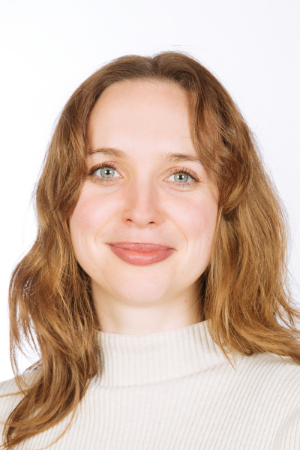Spotlight On: Amy H Fitzpatrick
My early passions leaned strongly towards creative expression rather than hard sciences. So when it came to filling out my CAO forms for university, I had no idea what I wanted to do. In a last-minute pivot, I swapped my top choice from Music to Nutrition, ultimately landing in UCD’s Food Science program in 2010.
swapped my top choice from Music to Nutrition, ultimately landing in UCD’s Food Science program in 2010.
My degree course was in the School of Agriculture and Food Science, providing a broad education in agricultural sciences. I went on an exchange to UC Davis in California in 2012 and was exposed to a different education and food system. It was fascinating to me, both as a scientist and a consumer, to learn how different food labelling regulations operated in other jurisdictions. I interned at the Food Safety Authority of Ireland (FSAI) in 2013 and was placed in the Food Incidents team working under Dr Martine Brennan. She encouraged me to explore food borne incidents in greater detail and view situations from a scientific perspective. I participated in an outbreak traceability investigation for a Hepatitis A (1A) outbreak. There were many unknowns and technical challenges. Dr Lisa O’Connor suggested I continue to work on the outbreak during my final year dissertation. I read many papers from Dr Charlotte Schultz and her research group in the Technical University of Denmark and decided that I would enrol in their MSc Eng program and specialise in foodborne viruses.
I moved to Copenhagen in 2014 and arrived in Dr Schultz’s laboratory shortly afterwards. As an MSc student I participated in many ongoing projects, from wastewater surveillance to foodborne outbreaks. I worked on virus concentration from wastewater samples and wrote my dissertation on quantitative microbial risk assessment as a method to infer dose-response for non-culturable viruses using norovirus as a case study. This framework was presented to the Danish Food Authority and answered some important questions about the impact of imported shellfish on gastrointestinal outbreaks. I was keen to continue working in foodborne virology and a position arose in the Marine Institute in Galway, working on the surveillance of foodborne viruses (FoVIRA).
While at the Marine Institute I optimised methods for the molecular detection of sapovirus, Hepatitis A and Hepatitis E in food. I participated in routine laboratory work providing a testing service for the shellfish industry in Ireland. Although I loved research, I found the routine work monotonous. When my manager, Dr Sinéad Keaveney, asked if I would be interested in moving to Cork to pursue a PhD on High Throughput Sequencing, I didn’t hesitate. I relocated in 2019 on a Cullen Fellowship and started my PhD in the Teagasc Food Research Centre in Moorepark.
I was placed in Prof. Paul Cotter’s Vision1 group where most of the team worked on the microbiome of different environments. Just as I was ready to start my experiments, we went into Covid-19 lockdown. Prof. Cotter suggested that I use the time to write and take on a bioinformatics project. Despite the ups and downs of a pandemic PhD, during which norovirus disappeared (hand washing really does work!), I learnt valuable skills in troubleshooting and maximising research output through well designed studies. By adapting microbiome techniques to virology, I was able to bridge gaps in bioinformatic workflows for viruses. As Dr Fiona Crispie was leading the Covid-19 sequencing efforts, I had access to the Oxford Nanopore Technology sequencing platforms and was able to transfer learnings from tiled amplicon approaches to my workflow for genotyping norovirus.
All of these experiences lead me to write a proposal for a postdoctoral fellowship from the Irish Research Council. I had heard Dr Nicola Fletcher (UCD) speak at a One Health conference and was interested in the work her group was doing. I had a few ideas about improving ONT viral metagenomics and wanted to pursue a more One Health approach. I was awarded the IRC fellowship the day before my PhD viva and went into my defence on a high. I couldn’t start the fellowship until September 2023 so I moved to Hanover to work for Dr Daniel Depledge on ONT RNA-Seq data from a dsDNA virus.
Currently I work on refining viral metagenomics protocols from RNA extraction to RNA virus assembly and annotation for non-clinical samples. I am primarily interested in using the viral RNA RdRp hallmark gene as a bait and capture approach for both novel virus annotation and for capture during metagenomics sequencing. I have trained other members of the group in ‘baby bioinformatics’ and contributed to other projects such as the ongoing virus surveillance of deer in the Phoenix park and high throughput sequencing of Hepatitis E in environmental matrices. I have had the pleasure of supervising students in MSc bioinformatic projects and ran a citizen science project ‘VirusHunters’, hosting nearly 100 students in UCD for a scientific poster session and careers talk.
Throughout my career I learned that adaptability and curiosity are essential survival skills in research. Along the way I have had the privilege of meeting wonderful people, including my partner. While research can be challenging due to its temporary nature, the chance to pursue curiosity-driven work and collaborate with amazing individuals is something I truly value. I am always cognizant of the senior researchers who supported and encouraged my career, and I try my best to emulate their efforts. For now, I am ready for my next big (non-scientific) adventure, becoming a twin parent.